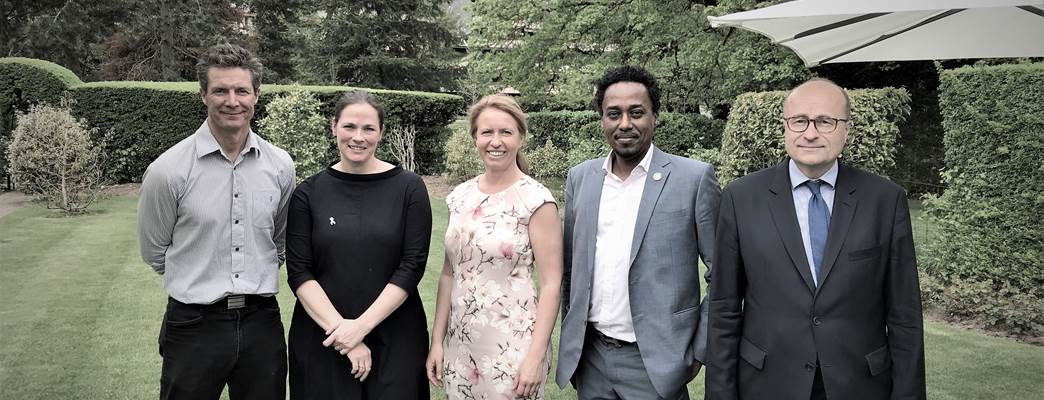A delegation, consisting of nine Norwegian enterprises as well as representatives from Innovation Norway, participated in a three-day programme on humanitarian efforts in health emergencies last week. The aim of the programme was to enhance private actors’ understanding of needs, approaches and constraints in humanitarian health efforts, and discuss with relevant stakeholders how better partnerships can be forged moving forward. A highlight of the programme was a reception on public-private partnerships in health emergencies with representatives from humanitarian organisations and the private sector. In his welcoming words, Ambassador Brattskar pointed out that the Ebola outbreak in 2014 had been a wake up-call. He emphasised that new ways of working, as well as expanded and improved partnerships are needed.
Dr. Ian Norton, head of the World Health Organisation’s (WHO) Emergency Medical Team (EMT) Initiative, shared some introductory words on the role of WHO vis a vis the private sector, and WHO’s new way of working with private organisations to fill critical gaps in covering health delivery in emergencies. He also congratulated Norway on being the first European country to establish an EMT. Saleban Omar from United Nations Development Program (UNDP) presented a unique cooperation between four Norwegian solar energy companies and UNDP to provide light and electricity to remote health stations. Electricity to these health stations has resulted in a significant increase in number of visits. This increase consists mainly of mothers giving birth after dark and vaccinations of children. Access to electricity means that the health stations can store vaccinations in the office for a longer period. This increases the flexibility for when a parent can bring their children to be vaccinated and therefore also the likelihood that they will be vaccinated.
Astrid Skreosen, CEO and founder of ASAP Norway, shared her motivation for developing high absorption sheets for births and other situations where bodily fluids are present and where risks of infection are high. She shared images from field visits to Damascus, where her sheets have been in use. Such field visits and dialogue with humanitarian actors help new and innovative companies better tailor their activities to meet humanitarian needs. CEO of Lærdal Global Health, Karoline Linde, further elaborated on the benefits of cross-sector partnerships. Lærdal Global Health is a not-for-profit company with an aim to save 400.000 lives each year through trainings and products developed to save new-borns and their mothers. Having mostly worked in development contexts, they now look to expand to humanitarian operations, as a growing number of maternal and new-born deaths are occurring in humanitarian settings.
Global health is one of the Norwegian Government’s main priorities in its foreign and development policy. Norway therefore supports the reform efforts that have taken place over the last few years, including WHO’s World Health Emergencies Programme, the new Surveillance System for Attacks on Health Care and the Contingency Fund for Emergencies. We encourage further dialogue on the role of partnerships in these efforts, including with the private sector.
Further reading:
WHO: Emergency Medical Team (EMT)
Secretary-General’s partnership report
Norwegian EMT (in Norwegian)
